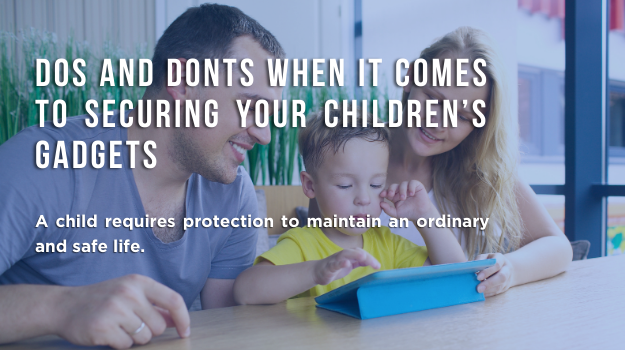
A child requires protection to maintain an ordinary and safe life. Rather than splurge an insane amount of money on security systems such as CCTVs, why not teach them to be smart individuals instead?
Are your kids paranoid that “someone” is watching their every move? Or maybe they’re just security-conscious and would like to maintain a high level of privacy at their age? No matter their reason for being careful with their online life, securing your children’s gadgets is a must.
Here are some dos and donts to give you an idea. Don’t worry. We’ve got you covered.
Dos and Don’ts When it Comes to Securing Your Children’s Gadgets
Sure, online privacy is a complex topic, but there are simple yet practical approaches to secure your children’s gadgets.
Let us start with the dos.

DOS
1. Teach them about cybersecurity.
Believe it or not, the online world is scary. To keep your children’s identity safe and sound, it’s vital to be proactive about cybersecurity. Cybersecurity is the practice of defending computers and other electronic systems, networks, and data from malicious attacks.
By giving them a heads up about cybersecurity, they will have an idea to secure their gadgets. Teach them the practice of securing a computer network from intruders, attackers, or opportunistic malware.
When you’re away, it’ll allow them to be mindful of their actions and have an idea of what to do.
2. Keep your kids’ devices up to date.
Remind them to log out of their devices whenever they turn off. Online hackers lurk online by exploiting faults in devices and software. When something flawed is found, you can bet they will be all over, so keep your devices and software updated.
Protect your kids’ personal information well.
3. Get the latest security software for your kids’ devices.
Having the latest security software, web browser, and operating system will defend your kids against viruses, malware, and other online threats.
4. Ask for protection beyond passwords.
Nowadays, there are additional ways for people to verify their accounts. In that way, your kids would be safe because all of the needed information is personal and can only be validated by the owner.
5. Make sure that your kids own their online presence.
Set out a unique password to your kid’s devices and social media accounts. One of a kind passwords for every account helps to prevent cybercriminals. Through the years, lame passwords are one of the top reasons why hackers are thriving. If possible, add some symbols and powerful words that’ll retain in their memory.
Ignoring these to-do list means leaving holes in your kids’ system that hackers can take advantage of. Please don’t give them the slightest chance.
Now that we’re done with the “to-do” list, let us now discuss the ones that should be avoided.

DONTS
1. Leaving your kid’s data unattended.
If your kid has a new gadget for learning, try to back it up and transfer their old data. Regular backups are one of the most important steps you can take to protect your kids’ devices and information. Also, having a backup of your old device makes moving to a new one much more effortless.
2. Doesn’t give a thought about “privacy settings.”
Set all factors to “private” to avoid any unnecessary content and damage to your children.
Nowadays, parents encounter immense challenges due to frequent advancements in technology. It is a good idea to sit with your children and teach them the importance of making their stuff confidential. Today, not everyone is concerned about what people do.
No one wants to be spied on, so it’s critically important for parents to take time out to communicate with their kids on what should and should not be shared online.
3. Not keeping up with technology.
It may seem impossible to keep up with every social media site that your kids use these days. However, the issue of safety is quite sensitive and complicated for them to understand at a young age.
As parents, allow yourself to discover technology with them. Explain to your kids to safely use the internet, browse with them to help them understand something, and be with them whatever issue it is.
Conclusion Trust between parent and child is beyond critical to survive this ever-evolving digital age. Make sure to follow the list above to succeed in being a parent in the 21st century.
